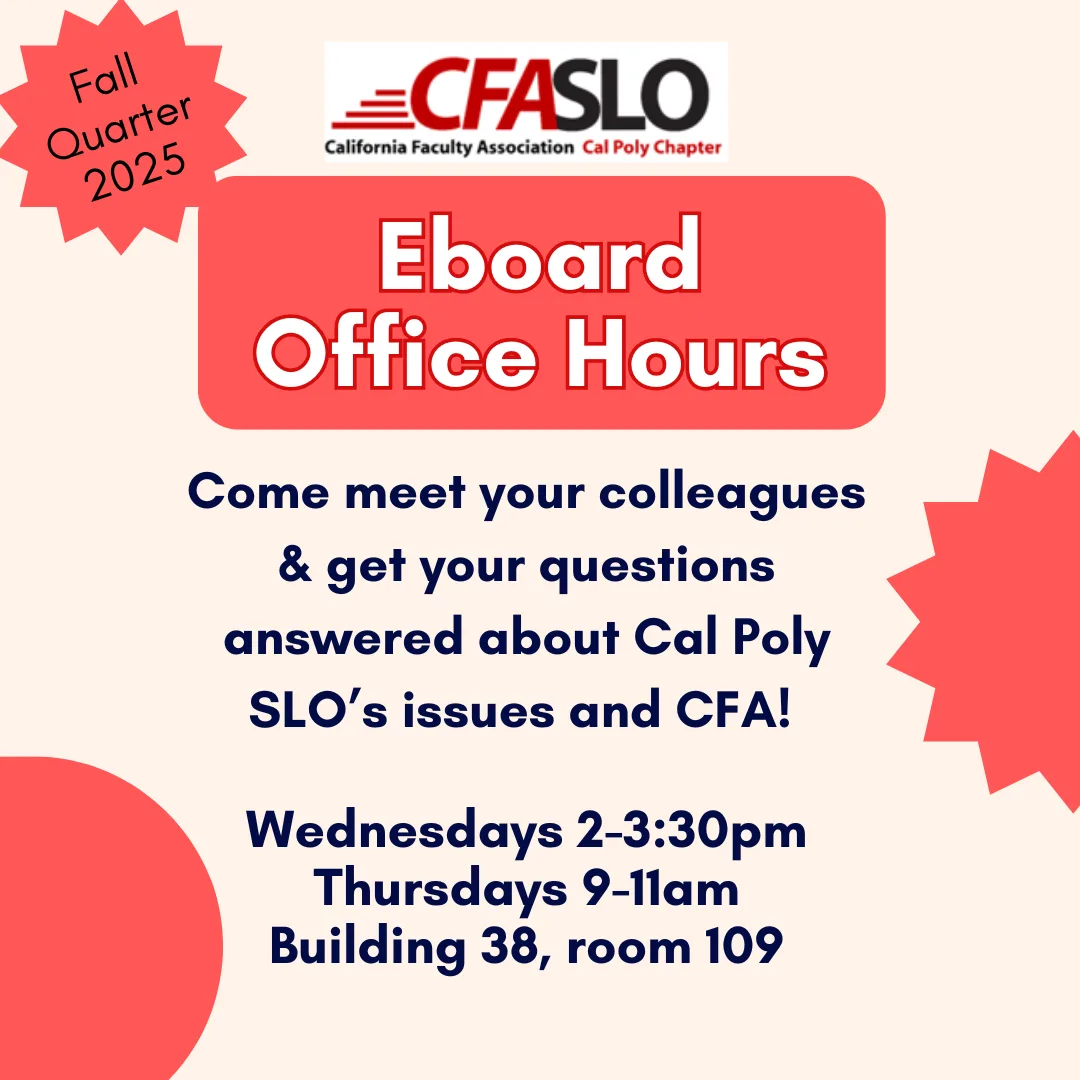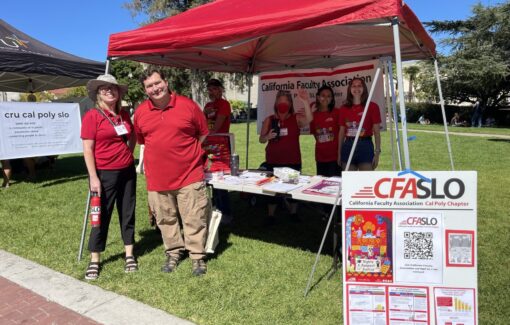CFA San Luis Obispo
ChapterGet in Touch
LOCAL EVENTS, NEWS & UPDATES
11/27, 8:30am: Cayucos Turkey Trot with CFA

Check out the new DISorientation Guide to the CSU by our SQE students!!!
Become a CFA MemberBecome A CFA Member
Join thousands of tenure-track faculty, lecturers, counselors, librarians, and coaches to protect academic freedom, faculty rights, safe workplaces, student learning, fair pay, and fight for racial and social justice.
Executive Board
Meet Your Cal Poly SLO Executive Board:
Lisa Kawamura
President
Cameron Jones
Vice President
Javier Medina
Treasurer
CFA-SLO Statement on Workload and Semester Conversion
As Cal Poly SLO transitions to semesters, we are committed to maintaining a quality education for our students. Thus, CFA-SLO endorses the following:
1. A standard semester workload of 9-3-3 for tenure-line faculty: 9 weighted teaching units (WTU) designated for teaching and instructional activities; 3 units for service; and 3 units for research, scholarly, and creative activities (RSCA), commensurate with established standards for retention and promotion.
2. Fulfillment of all lecturer entitlements, with no lecturer required to teach more than 12 units per semester to meet their entitlement. At least 3 WTU/semester shall be assigned to eligible lecturers who maintain currency in their field and/or perform service, consistent with established standards for re-appointment and range elevation.
3. Senate Resolution AS-944-22, reaffirming that each Academic Program shall set the unit values of its own courses.
CFA-SLO’s proposal provides tenure-line faculty with WTU in recognition of RSCA work and lecturers with WTU in recognition of service and the maintenance of currency in their fields. Reassigning WTU in this way corrects a longstanding discrepancy in our compensation. Our current workload allocates WTU only for teaching and service, but not RSCA. After their first two probationary years, for example, tenure-line faculty are still required to engage in RSCA for retention and tenure/promotion, but receive no WTU to complete this work. CFA-SLO believes WTU distributions should be updated to reflect the reality of faculty workloads.
Our proposal also implicitly challenges the assumption that teaching four 3-unit classes is equivalent to teaching three 4-unit classes. It is not. It is an increase in workload. A workload of four 3-unit classes represents an increase in simultaneous students, an increase in the total number of assignments that must be graded concurrently, an increase in the total number of course preparations per term, and an increase in the total number of class session preparations per teaching day. Such a schedule would degrade our ability to provide individualized attention to students, undermining the quality of a Cal Poly education and student success. (For a more detailed analysis, see this 2016 report on semester conversion and workload by Cal State San Bernardino’s Faculty Affairs Committee.)
Finally, CFA-SLO strongly endorses the related resolutions of our own Academic Senate, including the Senate’s reaffirmation of faculty control over curriculum and the assignment of course units. Our proposal is also similar in spirit to the recommendation of the Senate’s Ad Hoc Committee on Semester Conversion, which last spring proposed the establishment of an opt-in 9-3-3 WTU distribution system, similar to the opt-in system established at San Jose State. Like the Senate, we believe strongly in both the Teacher-Scholar Model and increasing tenure density.
FAQs:
Is this plausible?
Yes. Other campuses, including San Jose State and CSU San Marcos, have created and funded opt-in systems through which research-active faculty can continually receive WTU for RSCA work, though faculty must periodically reapply. Last spring, the Cal Poly Senate’s Ad Hoc Committee on Semester Conversion recommended exactly this kind of opt-in system, with a similar 9-3-3 distribution for tenure-line faculty. While CFA-SLO’s proposal is for a default redistribution of WTU (rather than an opt-in system), our model shares much in common with existing programs established within the CSU and with the recommendations of our own Senate.
Is this consistent with the contract?
Yes. Our contract does not specify how WTUs are to be apportioned. Our current workload and WTU distribution patterns are instead mostly matters of tradition, with origins in “common guides” set out nearly a half-century ago in EP&R 76-36 Faculty Workload: Policies and Procedures. EP&R 76-36 is an archaic document that was never intended as ironclad universal policy. Our contract has not explicitly referenced EP&R 76-36 since 1995, instead referring only generically to “past practice” regarding WTU assignments, without further clarification. Most significantly, EP&R 76-36 does not assign WTU for research, scholarly, and creative activities (RSCA), while our current contract clearly lists RSCA as among our “primary professional duties.” CFA-SLO’s workload proposal addresses this omission by proposing a reasonable revision and clarification of WTU apportionment.
Useful ResourcesUseful Resources
General Resources:
Current Contract (2022-2025) and Cal Poly Employee Salary Memo (July 29, 2022)
Retirement Resources from the CFA Retired Faculty Committee
Chapter meeting agendas and minutes are also available to members upon request.
Covid-19 Links:
Semester Conversion Resources:
CFA-SLO Statement on Workload and Semester Conversion (see above)
Schedule for Curriculum & Program Proposal Review (Academic Senate)
Resources for Lecturers:
Lecturers’ Handbook (2019-2020)
GrievancesGrievances
The grievance is one of the most important tools available to workers in a collective bargaining agreement environment, but it is also one that should be used as a last resort. Our experience is that, once a grievance has been filed, all other avenues for resolving an issue for a faculty member in a timely and meaningful way have been closed.
Grievances, because of the rigid nature of the process, can take 1-2 years to be decided and there is no guarantee that the outcome will be resolved to the satisfaction of the faculty member. This is why we want to address any issue as soon as possible, which means the faculty member must contact the union as soon as possible. Contact the faculty rights chair (or any other Eboard member) as soon as you think that there is a problem, so we can see if it can be resolved before a grievance needs to be filed.
If you have any question or issue that you feel might be ultimately grievable, email (from a non-Cal Poly email address) the faculty rights chair, Tad Walters and Silvia Marijuan, at facrightschair.sl@calfac.org
Join California Faculty Association
Join thousands of instructional faculty, librarians, counselors, and coaches to protect academic freedom, faculty rights, safe workplaces, higher education, student learning, and fight for racial and social justice.

